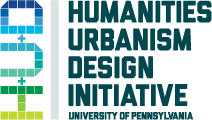
Students on the terrace of Palacio Capanema
The course “Cosmopolitan Urbanism: Rio de Janeiro” has taken as its object of study the uneven ways in which urban development proceeds through international and universalist models. It is taught by Daniel Barber, Assistant Professor of Architecture in the School of Design, and John Tresch, Associate Professor in History and Sociology of Science in the School of Arts and Sciences. Rio is an ideal site, not only in that the city has increasingly faced pressure to enter the network of ‘global cities’ over the past few decades, but also because its urban development has been subject to so many different forces, both internal and external, since its founding.The first part of the course was spent examine the history of Rio in the context of the history of architecture and urban planning, on the one hand, and the history of universal tropes of science, positivism, and development on the other. Special attention was also paid to the importance of Rio as a site for the elaboration of Brazilian identity, and for how this has played our recently through the recent World Cup and the upcoming Olympics. We then traveled to Rio and visited a heterogeneous collection of buildings and sites in order to explore the richness and diversity of the city. Some highlights: a visit inside the Palacio Capanema (also called the Ministry of Education and Heath, Lucio Costa, Oscar Niemeyer, et. al., 1936-1943); a tour of the renovations to the Pedregulho housing complex (Affonso Eduardo Reidy, 1947-1951); a soccer match at Maracana; and a visit to the Foundation Oswaldo Cruz including the Museum of Life and the original building that housed the laboratories for many of the public health experiments and vaccines that were so significant to the development of Brazil – and remain crucial to the region today. Now that we are back at Penn, students are hard at work preparing the collective project “RioAtlas: Cosmopolitan Urbanisms” in which they are expanding on their exploration of these different sites organizing them into a web-based interface. Students for the course are divided between the Architecture Department, History and Sociology of Science, and related fields. They are: Megan Bridges, Kahaari Kenyatta, Carissa Lim, Paul Marett, Martina Merlo, Ariela Osuna, Natalia Revelo, Monique Sager, Emma Schad, Emily Siegel, Sean Turner, and Lindsay Wong. We have also benefited from the experience of our TAs Erin Putalik, PhD Student in Architecture, and Rosanna Dent, PhD Candidate in History and Sociology of Science, and from the knowledge of Rio (and of Brazilian Portuguese) of Daniella Costa, a visiting scholar in Historic Preservation in the School of Design.

Renovations at Pedregulho.

Affonso Eduardo Reidy, Museo de Arte Moderna, Rio de Janeiro, 1952-57





